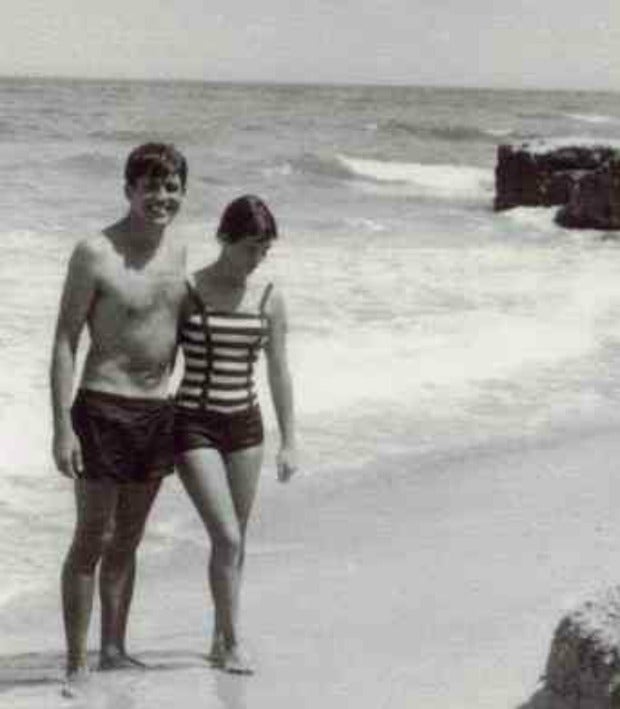What My Father's Suicide Taught Me About Being The 'I' When Saying 'I Love You'
Because 'love you' just isn't the same.
 Courtesy of the author
Courtesy of the author “Take care.”
For years that was my family’s sign-off at the end of phone conversations and visits alike.
To me, those two words expressed a similar sentiment to saying “I love you”: concern for a person’s well-being beyond the moment when you were talking, as they continued on apart from you, and you from them.
Most of my friends who talked with their families regularly said “I love you,” but we Hugheses were a little more formal and reserved.
And even after my father’s suicide, at age 75, speaking openly about loving one another didn’t come easily to us.
Our first attempt at incorporating love into our vocabulary started in October 2002, when, at my younger sister’s request, we started ending our phone conversations with “Love you.”
She was living in northern Virginia, and a series of sniper attacks in the D.C. area had left 10 people dead and my sister was rattled by how close to home the violence was.
Our mother, who kept us updated on one another’s goings-on, made the announcement about adopting a new form of good-bye in a phone call. She agreed with my sister that it was about time — past time — for us to start expressing a bit more familial affection.
We were distant from one another not only geographically — me in San Diego, my older sister in West Virginia, my brother in Nashville, and our parents in Maine — but also emotionally, keeping our interactions to infrequent e-mails, once-a-month phone calls, and once-a-year visits.
I had surprisingly little problem saying “I love you” to men I was romantically involved with. If anything, I said it too casually.
Using those three little words with men was like trying out a new identity.
“No you don’t,” one man said impatiently after I had made my declaration over egg rolls and pork-fried rice in a Chinese restaurant.
He was right, I didn’t. But I did love the idea of him.
And I wanted him to at least play along so I could find out what it felt like to be someone who said “I love you” to someone who said it back.
With lovers, friends, and pets — especially with pets — I became liberal with my use of love.
At the age of 33, I was finally using the four-letter word I had been afraid to for most of my adult life.
When it came to family, though, my throat tightened and my lips pursed. I grew miserly, hoarding the word as though it were in short supply.
When you’re unused to saying “love you,” let alone “I love you,” the statement feels forced at first.
For me and my family, it was forced — we were nonactors reciting a line of dialogue that had been thrust at us at the last minute, and we were still struggling not only to memorize it, but also to understand how to say it and what inflections to use.
Where did the emphasis land?
A breathy “Love you” as I’d say to a lover? Out of the question.
Casual and loose, like I’d say to my friends, with a hug? Nope; my family rarely hugged.
Cooing, as I did to my cat? Absolutely not.
My mother picked up “Love you” with alacrity, and it was difficult not to respond in kind because she said it like someone trying out a newly learned phrase in a foreign language: slightly embarrassed and tentative in the event an error was being made, but also proud and excited to be communicating in a different language.

The author's parents
My father, though, was more challenging. He always had been.
Prickly, proud, and willfully eccentric, he and his children were often at odds.
Like the end of any phone call with my father approached, a stiffness settled over our conversation. It was as though he and I were reluctantly playing a game, one where the object was to avoid getting caught out or exposed. We shuffled around awkwardly, one thanking the other for calling, the other responding with, “Thanks for answering.”
And so we would proceed, with feints and half steps, to the now mandatory sign-off.
"Love you."
Sometimes it was surly, muttered, and borderline hostile (yeah, yeah). Sometimes it was exasperating (can we just be done with this?). Sometimes it was curt (got it).
Still, as saying “Love you” to one another became routine, we grew more comfortable with it. Eventually, we were using it with almost the same ease as we had previously said “Take care.”
But despite our growing facility with “Love you,” we weren’t able to graduate to a full sentence.
We failed to add a subject to the verb and object.
For a sentence made up of just three single-syllable words, “I love you” is so complex.
The “I”— that’s what can make it so daunting.
“Love you” can be said blithely, breezily; it has a cool remove and can be tossed off at the end of a phone conversation.
But “I love you” is very different; it’s a statement, a declaration.
Five years into the “Love you” era, my mother called to tell me that my father had shot himself early that morning.
I don’t remember much of the phone call, except for my asking if my father was okay. It seemed impossible that a man so strong-willed could be dead, and surviving a self-inflicted gunshot wound to the head, while extremely rare, isn't entirely unheard of.
“No, he’s dead,” my mother replied, her voice catching on the last word.
“I’m sorry,” I blurted out, through sobs, and it was all I could say, over and over.
After I hung up, I couldn’t remember if I’d said the routine two-word sign-off.
I was apologizing for so much, and far too late.
My father was dead, and he had died believing he was alone. If I had said “Love you” to him more often, rather than getting off the phone as quickly as possible, would he still be alive? Could that have kept the depression that dogged him for most of his adult life at bay? Had my stinginess contributed to his decision to kill himself?
But really, my expression of love would have been no antidote. It was barely a placebo, there was so little sugar to it.
I had been so reluctant to say it, let alone to attach “I.” And even if it had been expressed less begrudgingly, that was attributing far too much power to my “Love you.”
I spent the rest of the day canceling plans with friends and rearranging work deadlines.
One friend I called said, “Well, at least he lived a long life.”
My friend, however ham-handed his attempt at consolation, wasn’t wrong. After all, my father had been 75.
But he had died by his own hand, not from natural causes. And he was far from the only one to do so.
According to the most recent data from American Foundation for Suicide Prevention, 47,173 Americans died by suicide in 2017, with the rate of suicide being highest (20.2 percent) among adults between the ages of 45 to 54, and second-highest (20.1 percent) among those 85 years of age and older.
Of those more than 47,000 deaths, 69.67 percent were white males, like my father.
In the days immediately after my father’s death, we kept his everyday objects close.
I slept in one of his old nightshirts. My mother took several long sips from the Nalgene bottle that my father had filled with water the night before he killed himself, just as he had filled it every other night.
He probably hadn’t expected to empty the bottle before he got up early in the morning, dressed, and scrawled a brief note of apology before heading to the barn and climbing the stairs to the hayloft. But that evidence of a routine that would no longer be performed made it sacred.
“Precious, precious water,” my mother said, before pouring the rest of it into the sink.
The day before my father’s funeral, my mother and I stood in front of their bedroom closet.
She had wrapped my father’s black-and-white checked silk scarf loosely around her neck. We were going through items of his clothing, with occasional detours into small stacks of photos, bundles of old correspondence, and a cache of the colorful, “collectors’ edition” Kleenex boxes he was fond of.
While we surveyed the remnants of their 44 years together, I began to flounder.
Just the night before, I had contemplated smashing my fist into a window, because broken bones would have been grounding, a welcome distraction — a different, more manageable kind of pain.
I wanted my mother to reassure me, the way she had when I was a child, that everything would be okay.
“I love you,” I said, and moved to embrace her. But she was already turning away, busying herself with another task.
Had she not heard me? Or had she chosen to ignore me?
I wrapped my arms around myself, feeling rebuffed that she hadn’t responded in kind, or at least paused for a moment to absorb my words; then feeling selfish for not recognizing how she was struggling to navigate through her own pain, focusing on small tasks like they were debris to be grasped at, potential lifesavers in the flood of grief.
It wasn’t until much later that I realized love isn’t about needing to have your offering noted and appreciated.
Rather, it is about needing those things and being able to set them aside to be the fully present, undemanding “I” in “I love you.”
Twelve years after my father’s suicide, I still struggle with saying “I love you” at the end of a conversation with my mother or siblings, sometimes swallowing the “I” or rushing it.
Moving beyond that shorthand is no small feat.
But I keep trying, with the hope that someday I will be able to say “I love you” without reservation, without self-consciousness, with a full-throated, full-bodied “I.”
We can all help prevent suicide. The Lifeline provides 24/7, free and confidential support for people in distress, prevention and crisis resources for you or your loved ones, and best practices for professionals.
Call 1-800-273-TALK (8255) to speak confidentially to a trained crisis worker.
Heather Hughes is a freelance writer and copy editor based in Tucson, Arizona. Her work has appeared on Ozy, The Establishment, and Salon, among other titles. For more, visit her website.

